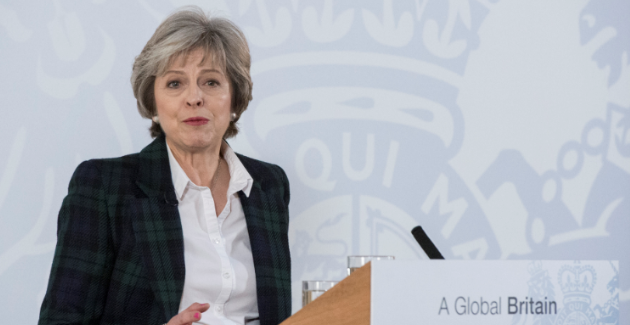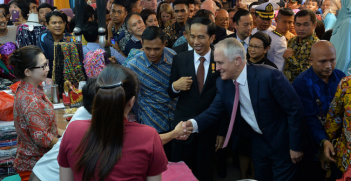Brexit: Don’t Let the Door Hit You on the Way Out

The United Kingdom has now triggered Article 50 with the delivery of a letter from the British Prime Minister to the President of the European Council. It marks the start of two years’ countdown to Brexit and real challenges for Theresa May.
Prime Minister Theresa May, who has finally served the required two years’ notice to end the United Kingdom’s 44-year membership of the European Union, is a “bloody difficult woman”. So said Ken Clarke, the only Tory MP to vote against the bill authorising Brexit earlier this year.
The epithet does not upset the prime minister. She is adept at sweeping aside all criticism and refused to listen to those who argued Britain should at least negotiate to stay in one part of the EU: the single market.
This is a measure of May’s political strength. Nine months since becoming prime minister, she faces no competition: the Labour Party is a train wreck, UKIP has lost its only MP, the Scottish nationalists are noisy but impotent, and there is not a Tory challenger in sight. The hard part remains ahead.
There are three main reasons. First, the British will have almost no control over the process: the timing will be set by European Commission officials. Second, the contest will so dominate Westminster politics that the prime minister will have no time for her domestic agenda, not least the promises made in her first, emotional speech outside 10 Downing Street last year. Thirdly, winds of change are blowing through the EU; it may be hard to imagine major changes occurring quickly, but it is not inconceivable that the Brussels club will morph into a more flexible institution that a sensible British leader would wish to join.
The process
The next step is for the other EU countries to establish guidelines for negotiations. These will not be formally agreed until a meeting on 29 April. The EU’s chief negotiator Michel Barnier has intimated that the EU’s demands for outstanding payments, estimated at £60 billion (AU$95 billion), will top the agenda. Then will come the future rights of EU citizens in Britain, a process Theresa May has so far refused to support.
The French presidential elections will be a distraction during this period. A victory by Marine Le Pen is unlikely but would trigger a crisis in the EU. Otherwise discussions on the detailed proposal to be put to the British will continue in May and June.
Many commentators play down the role of the European Commission. They fail to understand how the European structure works, assuming that decisions are taken by powerful national leaders. Yet the commission is much more than an EU public service. ‘The commission proposes and the council disposes’ is the maxim governing the EU—the council being the leaders of EU member countries—though these days the European Parliament must also approve all new laws.
President of the European Commission Jean-Claude Juncker is no pushover. Over lunch two weeks ago, he told Lionel Barber, editor of the Financial Times, that Brexit was a “tragedy”, adding with Delphic emphasis, “people do not know that this tragedy will lead to conclusions”. Yet Juncker knows Brexit will also harm the EU, telling Barber that “Germany cannot replace Britain nor supplant Britain’s role in the transatlantic relationship”.
Even more precise has been chief negotiator Barnier, who said Britain would be “gravely affected” if it accepted May’s advice that “no deal is better than a bad deal”. In that event, said Barnier, British businesses would face significant supply chain problems, the reintroduction of customs controls could gum up British ports and there would be major challenges for air travel to and from the UK. Britain’s nuclear industry might run out of fuel.
By June, British MPs will be embroiled in the Great Repeal Bill, in which every piece of EU law will be adopted as British law and then debated, accepted or rejected. September will see the German election, and in the following month the final shape of the EU offer should emerge, giving the Theresa May her first real chance to negotiate.
May’s promises
May won a lot of public support for her first speech as prime minister, pledging:
“We will do everything we can to give you more control over your lives. When we take the big calls, we’ll think not of the powerful but you. When we pass new laws, we’ll listen not to the mighty, but you. When it comes to taxes we’ll prioritise not the wealthy, but you. When it comes to opportunity, we won’t entrench the advantages of the fortunate few. We will do everything we can to help anybody, whatever your background, to go as far as your talents will take you.“
May has had neither the time nor the money to fulfil these promises. The National Health Service remains in chaos and the pledge to give £350 million a week to it from saved EU dues will not be kept. English schools underperform. Her diligent chancellor, Phillip Hammond, is desperately trying to balance the books.
Britons will become restless if May does not deliver the Brexiteers’ over-egged promises. So will rightwing Tories. As her nemesis Ken Clarke put it, “They are like crocodiles swimming around the boat. You can keep them at bay by feeding them buns, but the problem comes when you run out of buns.”
Reforming the EU
The third development may become the most significant: European Union reform. Once the German elections are over, Juncker intends to mark his final years as president of the European Commission by proposing major reform. Details remain sketchy, but he has already dropped broad hints in speeches.
Gone will be the drift towards federalism so disliked by the British and the original cause of the rupture from Europe in the Cameron years. Juncker has in mind a two-speed Europe, in which the stronger EU countries will work closely together, while the periphery will stay within the union but be freer to legislate for their own economies.
The future of the Brexit negotiations is as unpredictable as the British weather. Theresa May is used to this and will not easily be blown off course. But she might remember the words attributed to one of her predecessors, Harold Macmillan. Asked what he most feared, he replied, “Events, dear boy, events.” There are still plenty of events in the next two years to derail Brexit.
Colin Chapman is immediate past president of AIIA in NSW. As a former economic correspondent at the BBC and a senior executive at the Financial Times, he spent much time in Brussels covering EU issues and still maintains close connections with policymakers.
This article is published under a Creative Commons Licence and may be republished with attribution.





